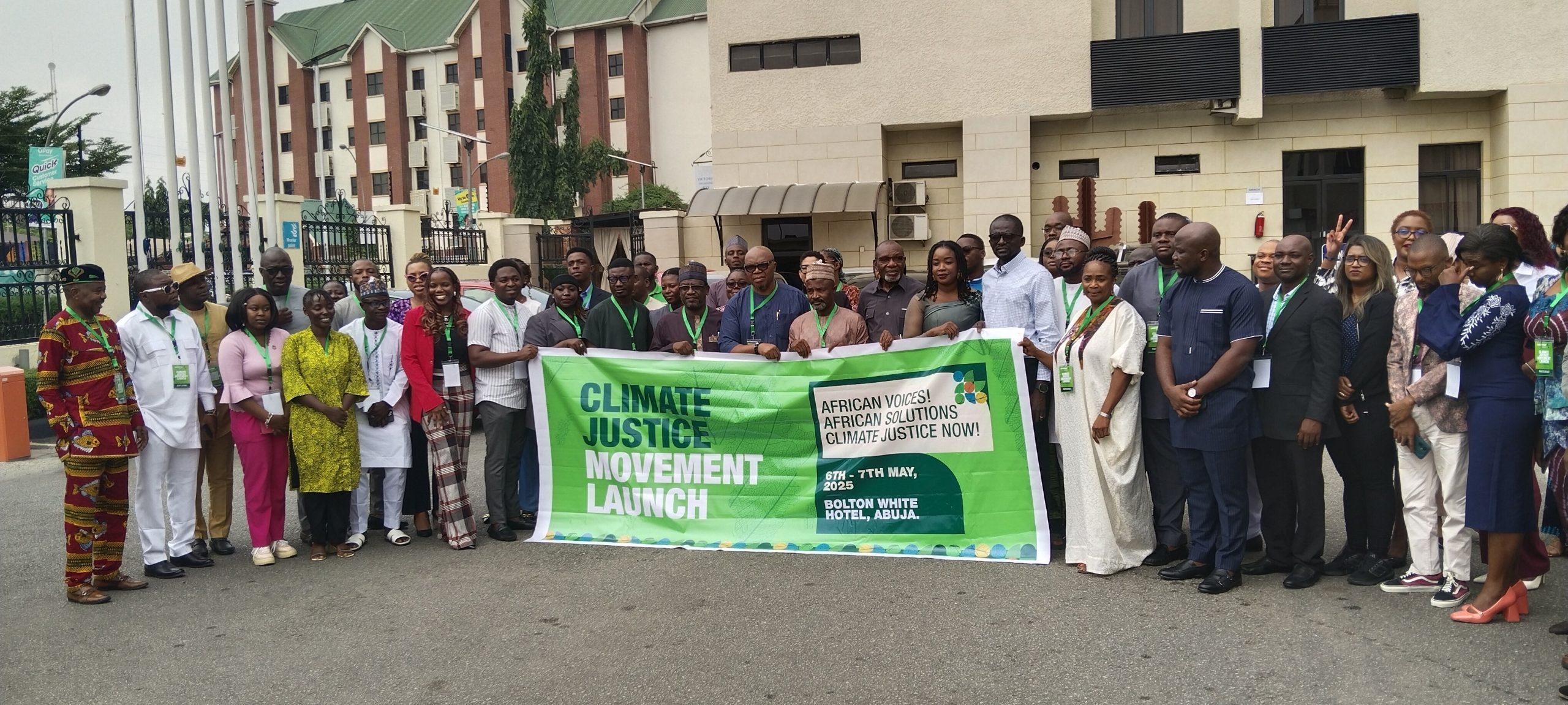Maureen Okpe
In a landmark development for environmental advocacy in Nigeria, over 40 civil society organisations (CSOs) have officially launched the Climate Justice Movement (CJM).
This is aimed at uniting, under one powerful voice to demand accountability from corporate polluters and call for climate justice across the country and Africa at large.
The two-day summit, organized by Greenpeace Africa, with theme; “harnessing people’s power to change the neo-colonel socio-economic system, held in Abuja, brought together climate and energy campaigners, food security experts, human rights advocates, and grassroots organisations from across Nigeria.
Read Also: Transcorp Hilton Abuja, CODE Commemorate 2025 Earth Hour to Save the Planet
The event culminated in the launching of an act, aimed at holding companies accountable for environmental degradation, demanding reparations for affected communities, and charting a path toward a just energy transition.
Climate and Energy Campaigner for Greenpeace Africa, Cynthia Moyo,disclosed that, Nigeria has emerged as one of the countries most affected by the worsening climate crisis.
She spotlighted effects to include catastrophic floods to prolonged droughts, erratic rainfall patterns, and rising food insecurity, millions of citizens are grappling with the severe consequences of a rapidly changing climate.
“Climate change is not on its way—it has already arrived and it is hitting Nigeria very hard, from Port Harcourt’s soot-covered skies to drought-ravaged Yobe, the impacts are devastating. We need systemic solutions that reject fossil fuels and prioritize the people.”
She noted that, the CJM declaration makes provision for immediate cleanup of oil-polluted sites in the Niger Delta, compensation for affected communities, an end to gas flaring and fossil fuel subsidies, a transition to renewable energy, strengthened environmental regulations, and rejection of carbon trading as a false solution.
“Nigeria stands at an energy crossroad.We can either continue investing in outdated fossil fuels or embrace a future powered by sun, wind, and people. The choice is clear.”
For her part, Oil and Gas Campaigner for Greenpeace Africa, Sherelee Odayar,blamed multinational oil companies, especially in the Niger Delta, for decades of pollution, gas flaring, oil spills, and the displacement of communities.
She said, “For too long, corporations like Shell have extracted billions from our land while leaving devastation behind.
Read Also: UK, Nigeria Launches Creative Industries Technical Working Group
“Our ecosystems are destroyed, our people suffer ill health, and yet these companies continue to profit. That must end.”
Programme Director, Greenpeace Africa, Murtala Touray, reiterated that, the CJM act that was launched is the beginning of a journey.
He charged civil societies and relevant stakeholders on collaboration adding, it has to be a win- win situation.
“A win for the community, win for the climate and the government as the government is here to ensure that profitability is not at the expense and wellbeing of the people. We are here to demand justice for our country, community so we have a sustainable justice.
“Africans are bearing the brunt. There is need to ensure that the money and funds get to the people . We know it’s not a one day struggle but the end goal is that community get what they deserve.”
Also, the Food Security Campaigner at Greenpeace Africa, Elizabeth Atieno revealed that Nigeria loses up to 40% of its agricultural output annually, worth about N3.5 trillion, due to climate-related disasters.
She said, “Thirty million Nigerians are at risk of acute hunger between June and August this year.”
Atieno while citing the FAO 2025 report noted, “This is not just a food crisis; it’s a justice crisis. Our communities are suffering from problems they didn’t create.”
She advocated for agroecology, a sustainable farming system that restores degraded land and empowers local communities, especially women and youth.
In the same vein, Ibrahim Muhammad Shamsuddin, Program Manager at Yanayl Haki Afriqya, emphasized the vital roles played by youth and women in CJ advocacy.
Shamsuddin stated that, “Young Nigerians are rejecting the system where profit comes before people. This movement is our pledge to fight for a healthier and just Nigeria.”
Dr. Terngu Gwar of the National Human Rights Commission (NHRC) underscored the importance of recognizing climate change as a human rights issue.
According to him, “there is insufficient understanding of the link between climate and human rights.”
Speaking on the Commissions policies, Gwar disclosed that, “We are working to integrate rights-based approaches into policy interventions and ensure affected communities, especially in the Niger Delta, receive justice.
The Climate Justice Movement aims to transform fragmented campaigns into a unified force pushing for environmental and social justice in Nigeria. The event marks a significant step in Nigeria’s climate advocacy, reflecting the urgency to protect the nation’s environment, health, and future.

